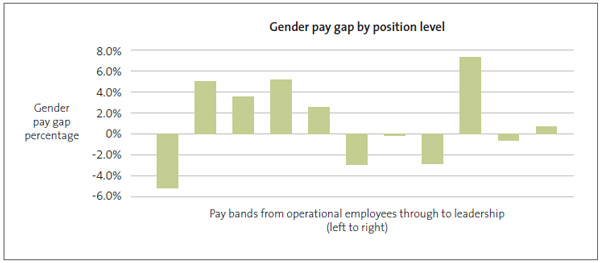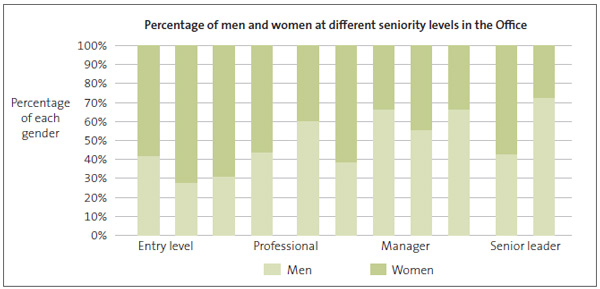Part 4: Our capability
Our independence and reputation
Our independence and reputation are critical to maintaining the trust and confidence of Parliament and the public in our work and upholding our position as a pillar in New Zealand's national integrity system.
For 2023/24, we were satisfied that we upheld our independence and complied with the Auditor-General's independence standards. To achieve this, we monitored and managed potential conflicts of interest for our staff, appointed auditors, and the audit service providers carrying out audits on behalf of the Auditor-General.
Improving our culture of integrity
Although integrity has always been critical to our work, we recognise that we can take a more deliberate approach to our own integrity systems and processes. We want to be able to monitor how well our values, staff behaviour, and internal controls are aligned.
In 2023/24, we:
- assessed the Office's performance against our integrity framework for the public sector;2
- established a new Protected Disclosures Policy and provided training for all staff to improve understanding of all the ways they can raise issues and concerns;
- continued to embed our core values in our internal policies and guidance,3 including reviewing policies on sensitive expenditure; and
- started work to monitor and report on our own integrity.
All these actions enable and support our people to act with integrity as they carry out their work.
Developing our capability in te ao Māori
We audit a range of kaupapa Māori organisations, including departments, Crown entities, and schools. This year we continued to develop our te ao Māori strategy, Kia Tika. The strategy's priorities are to:
- build meaningful relationships with iwi, Māori organisations, and individuals;
- actively seek Māori perspectives on public accountability and seek Māori input into our annual planning;
- increase our capability to engage with and respond to Māori, both by supporting the development and aspirations of staff and by attracting people with the right skills and experience at all levels of the Office;
- consider how our work can best influence the delivery of public services to support the desired outcomes of iwi, hapū, and whānau Māori;
- adapt our working styles and practices to enable effective and respectful engagement on matters of importance to iwi, hapū, and whānau Māori; and
- ensure that we are transparent about our use of Māori data, and feed back to Māori communities and organisations we have engaged with about how we have used their data.
Helping our people to thrive
We aim to provide a working environment that supports our people in a range of domains, from physical safety to career development.
Health, safety, and well-being
In 2023/24, we provided specialist support to our staff working on sensitive audits (including on youth mental health and on harmful behaviour in the New Zealand Defence Force). We also started a review of our practices and policies about health, safety, and well-being.
Training and internships
Audit New Zealand is a Recognised Training Employer – we provide our staff with the professional study programme and support needed to gain a chartered accountant qualification, as well as providing ongoing development. In 2023/24, the pass rate of our staff in the Chartered Accountants Programme was 89%, including 10 High Distinction Merit passes (awarded to the top 5% of all New Zealand and overseas candidates who sit the same exam).
We also support people with similar qualifications from other international accounting bodies. As a core part of its training role, Audit New Zealand welcomed 30 recent graduates in January 2024.
Each year we dedicate significant time and resources to our nine-week summer internship programme. In November 2023, we welcomed eight auditing interns to Audit New Zealand for a programme of formal training, mentoring, and guided on-the-job experience with a range of clients.
This year, as part of a partnership with Auckland University of Technology, we hosted our first Pasifika student intern for an eight-week placement in our Wellington office. We also hosted a student from the Whitireia Publishing Programme for work experience in our Publications team.
Leadership
Our audit directors are well respected in the auditing profession. In 2023, Chartered Accountants Australia New Zealand awarded five new Fellowships to leaders at the Office. Our new Fellows join other colleagues who have been recognised for their contributions to their profession and communities.
In 2023/24, we continued to develop our leaders by offering training opportunities for people in different stages of their leadership journey, from aspiring leaders to experienced leaders, and by providing coaching programmes to further develop our leaders' skills.
Recruitment, retention, and remuneration
We strive to recruit the best talent, create a culture where our people thrive, and provide appropriate remuneration. This year we have actively managed workloads and other pressures to support staff well-being, and provided varied and engaging work to help lift employee engagement.
We have also built and maintained strong relationships with international audit institutions to create a reciprocal international secondment pathway, which both helps us to meet some capacity needs and provides additional career development opportunities. This year, we supported six of our staff on international secondments and welcomed seven international secondees into the Office.
Capability development
We continued to increase capability across the Office by offering a wide range of development opportunities, including:
- organisation-wide training to promote diversity and culture;
- group-specific programmes tailored to specific roles, aligned to our competency framework;
- our Careers Board process, which helps identify strengths and interests and offers tailored opportunities for participants to increase their skills and gain experience; and
- continuing professional development for staff, including our legal and accounting staff.
Diversity and equal employment opportunities
Under the Public Audit Act 2001, the Auditor-General must prepare and publish an equal employment opportunities programme, comply with it, and describe in the annual report how it was met. Equal employment opportunities are critical to creating a workplace where employees can reach their full potential. Creating a culture where diversity is valued and people can thrive ensures that the Office can do its best work. The principles of equal employment opportunities are embedded in our people policies and practice. We provide equality of opportunity throughout the employee life cycle.
We have recently collected more information on the make-up of our workforce to better understand and report on broader diversity indicators and identify any ethnicity-based pay gaps, alongside our work to understand our gender pay gap.
| We publish information about our staff numbers and staff diversity in the "About us | Our people" section of our website. |
Gender pay gap
Our overall gender pay gap sits at 17%. This is 11.4% within the Office of the Auditor-General and Corporate Services Group, and 18.9% in Audit New Zealand. Gender pay gaps can be both horizontal (different pay for comparable roles) and vertical (different gender balance at different levels of the organisation). The Office has small horizontal gaps but more significant vertical gaps.
The graph below shows the Office's horizontal pay gaps at different remuneration bands (excluding the Auditor-General and Deputy Auditor-General). A negative gap means that women are paid more than men doing a similar role. The highest gender pay gap is 7.3% and the lowest is -5.2%, with an average of 1.1%.

Our vertical gaps are due to the Office generally having more women in entry-level and administrative roles and more men in more senior roles, as shown in the graph below (which includes the Auditor-General and Deputy Auditor-General).

The main vertical gaps are:
- in Audit New Zealand, where we still need more women in director roles – 70% of our audit directors are men (64% of equity partners in New Zealand accounting firms are men), and the pace of change is limited by a low turnover of 3.6%. However, we have increased the percentage of women in manager and director roles from 33% in 2019 to 48.5% in 2024; and
- in our leadership team, where new appointments to senior leader roles have seen the gender imbalance worsen (27% of the senior leaders in the Combined Leadership Team are women).
According to a recent survey by Chartered Accountants Australia and New Zealand, the national accounting industry gender pay gap is 22%. This means we are doing better than many employers offering similar work. However, we have more to do and will continue to take opportunities to reduce these gaps over time.
We place a strong importance on balanced recruitment panels and consider different perspectives throughout the recruitment process. We continue to improve our flexible and hybrid working arrangements to support those with family and commitments outside of work. We want women to see career progression in Audit New Zealand as achievable.
| Our staff networks We have several employee-led groups – the Te Ao Māori Champions Network, Pasifika Network, Rainbow Network, and Women's Network. These staff networks support diversity and well-being through a mix of social support, peer learning, providing feedback on internal policies and strategies, and organising cultural events. Some highlights for 2023/24 are:
|
Our technology
We have continued to modernise our information technology infrastructure through our Information Systems Strategic Plan, which is part of our long-term plan to modernise the Office.
The focus in 2023/24 has been on building a more modern, more secure, and more resilient technology environment underpinned by a sound technology infrastructure:
- The Office's on-site support systems have been updated, and work is under way to move to a network that supports Cloud-first services and a Zero Trust security model. We also continued to strengthen our remote working tools and processes so that staff can work flexibly and securely anywhere.
- In 2023, we implemented a new Cloud-based audit management tool (Auvenir) for Audit New Zealand's audit and assurance work. This will progressively replace the previous system, which is more than 20 years old. During 2023/24, Audit New Zealand began training staff and moving audits over to the new tool as part of a phased implementation. More than a hundred audits are now being carried out using Auvenir.
- A new audit management portal for our audit service providers went live in 2024.
- We are currently implementing our new information management system, Raranga. This will move the Office's files to the Cloud and allow staff to better collaborate, as well as setting the foundation for the secure use of artificial intelligence tools.
Our future focus will shift towards systems that support enhanced insight and engagement, with work in early stages on a digital strategy and redevelopment of our website, as well as work on tools to enhance data analysis.
Our financial and physical resources
We are mostly funded through charging fees to recover our costs for the audit and assurance services we provide to public organisations. We manage these fees through our Audit and Assurance Services memorandum account. We also receive Crown funding for aspects of our work that directly support accountability to Parliament, such as advising select committees and reporting to Parliament and the public on our performance audits and inquiries.
As part of our response to reduce delivery pressures caused in part by the Covid-19 pandemic, in 2021/22 we reallocated 80,000 hours of audits across our portfolio. We also increased the size of Audit New Zealand's workforce to help manage deferred audits and progress current audits. These actions, along with rising costs, higher inflation, and limiting fee increases before and during the pandemic, led to financial pressures on Audit New Zealand.
To put Audit New Zealand in a sustainable financial position in the medium term, we have put several initiatives in place, including:
- a capital injection to address increased audit costs caused by Covid-19 that could not be recovered through fees;
- resetting our fees to better recover our costs and appropriately scope our audits;
- implementing a programme of work to improve Audit New Zealand's practice management, work more efficiently, and invest for the future; and
- preparing to reallocate audits back to Audit New Zealand from 2025 to 2027.
In 2023/24, Audit New Zealand returned a small surplus for the first time in three years. We are on track to achieve our plan of ensuring that Audit New Zealand is self-sufficient and a strong benchmark provider of public sector audits.
Our use of natural resources
Public organisations are expected to use their resources wis ely, including the natural resources they consume, and to strive to minimise their environmental impacts as much as possible. We have assessed the environmental impact of our activities for the past few years, looking for ways to reduce or mitigate it.
Our main sources of emissions are from business-related air and road travel, staff commuting, and fuel for our vehicle fleet.
In 2023/24, we have:
- improved the accuracy of our emissions data and prepared a greenhouse gas emissions inventory for a third year; and
- completed a "pilot" programme to record emissions from three audit service providers (included in our inventory), and rolled this out for all our outsourced audits starting 1 July 2024.
Our overall emissions have decreased by 49 tCO₂e in the past year, due mainly to a significant reduction in international travel.
We had planned to set emissions targets, but without emissions data from external audit service providers, it is difficult to establish accurate baseline data and set an overall meaningful reduction target. We plan to set emissions targets in 2025/26, after collecting relevant emissions data for 2024/25 from all external audit service providers that carry out public sector audits on behalf of the Auditor-General.
Our emissions inventory is set out in Appendix 6.
2: See Controller and Auditor-General (2022), Putting integrity at the core of how public organisations operate: An integrity framework for the public sector, at oag.parliament.nz.
3: Our four core values are People matter, Our independence is critical, We act with integrity and courage, and We’re here to make a difference.

